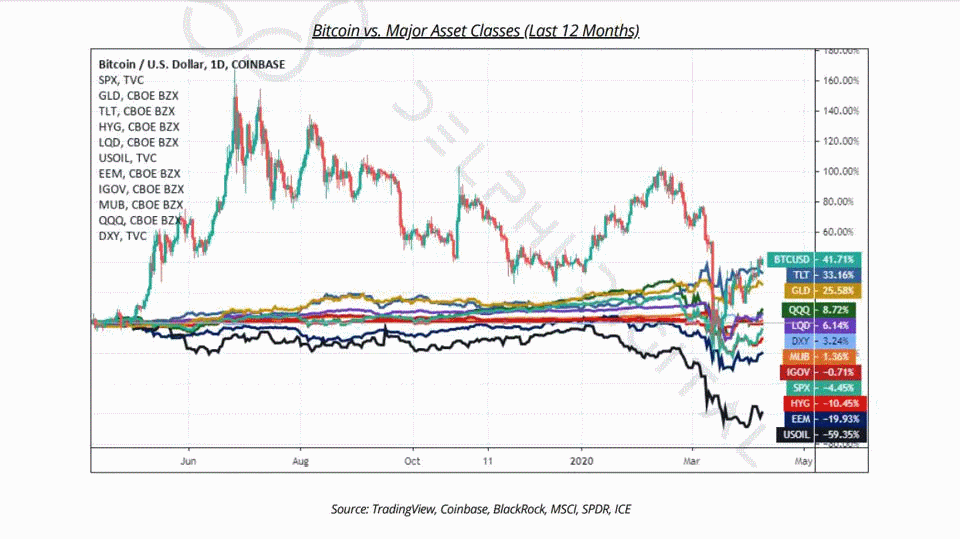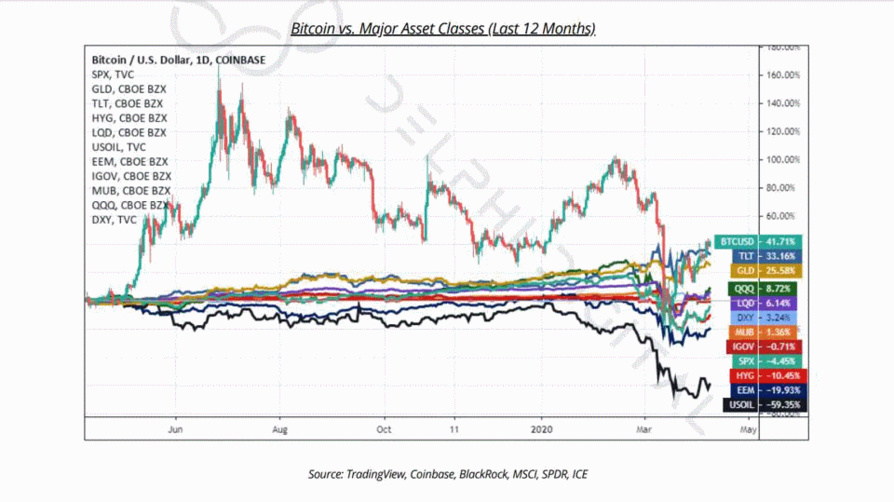IMAGE SOURCE
Bitcoin has been trying to rebound and then it drops again. As I write this, it’s well off its April 13 high of nearly $65,000, hovering at $35.9k. Bitcoin’s price has plunged nearly 40 percent since early May, its worst month, since September 2011. This free fall comes after Elon Mush announced that Tesla would stop accepting bitcoin for purchases and after regulators in China banned Chinese banks and other financial institutions from supporting bitcoin, including processing payments, allowing customers to hold bitcoin in their accounts and converting bitcoin into yuan or other currencies. The roller-coaster in bitcoin is raising questions about its risks as an investment and viability as a financial asset. Major financial industry players, including Fidelity Investments and SkyBridge Capital are pressing the SEC to approve plans to launch funds on public stock markets that would let small retail investors tap into the rise of bitcoin prices. The SEC always been skeptical of bitcoin funds, going as far as rejecting earlier proposals by the Winklevoss twins, because of worries that the agency could not guarantee safeguards against fraud and manipulation. Given the growth of the market and increased interest, the dynamics are quite different than in the past, but the recent wild swings of crypto prices are a concern for regulators making them hesitant to agree on any regulations being put in.
As critics and defenders of bitcoin continue to argue over its future, what’s clear is that crypto investments are not for the faint hearted. In the last five months, bitcoin has had some dramatic ups and downs. Let’s start by looking at a timeline of events since December:
- 16 December 2020 – Price hits $20,000 per coin for the first time
- 3 January 2021 – In the first few days of the year the price rises above $34,000
- 9 February – New high of $48,000, after Tesla buys $1.5 billion worth of bitcoin
- 21 February – Bitcoins hits $58,354
- 23 February – Price falls to $44,845.72, losing 18.4% in a day
- 13 March – New high of $61,701
- 17 March – Morgan Stanley becomes the first big US bank to offer wealthier clients access to bitcoin funds – restricted to no more than 2.5% of an investor’s total net worth
- 24 March – Elon Musk tweets that Tesla cars can be purchased using bitcoin
- 13 April – New high of $63,375
- 19 April – Biggest drop in a single day in two months, falling 25% to $55,000
- 23 April – Down to $49,730
- 10 May – Reaches more than $59,300
- 12 May – Elon Musk tweets about environmental impact of bitcoin, causing it to drop to $49,000
- 19 May – China bans financial, payment institutions from cryptocurrency business and bitcoin fell below $34,000 for the first time in three months
As Bitcoin has grown more into maturity, it has survived several attacks, and its price has increased over the years. It has broken 1 trillion in market cap, outperformed all other major asset classes and Wall Street is buying into its narrative. But now it needs to deal with the witch hunt from traditional media, about energy FUD.
Bitcoin has been trying to rebound and then it drops again. As I write this, it’s well off its April 13 high of nearly $65,000, hovering at $35.9k. Bitcoin’s price has plunged nearly 40 percent since early May, its worst month, since September 2011. This free fall comes after Elon Mush announced that Tesla would stop accepting bitcoin for purchases and after regulators in China banned Chinese banks and other financial institutions from supporting bitcoin, including processing payments, allowing customers to hold bitcoin in their accounts and converting bitcoin into yuan or other currencies. The roller-coaster in bitcoin is raising questions about its risks as an investment and viability as a financial asset. Major financial industry players, including Fidelity Investments and SkyBridge Capital are pressing the SEC to approve plans to launch funds on public stock markets that would let small retail investors tap into the rise of bitcoin prices. The SEC always been skeptical of bitcoin funds, going as far as rejecting earlier proposals by the Winklevoss twins, because of worries that the agency could not guarantee safeguards against fraud and manipulation. Given the growth of the market and increased interest, the dynamics are quite different than in the past, but the recent wild swings of crypto prices are a concern for regulators making them hesitant to agree on any regulations being put in.
As critics and defenders of bitcoin continue to argue over its future, what’s clear is that crypto investments are not for the faint hearted. In the last five months, bitcoin has had some dramatic ups and downs. Let’s start by looking at a timeline of events since December:
- 16 December 2020 – Price hits $20,000 per coin for the first time
- 3 January 2021 – In the first few days of the year the price rises above $34,000
- 9 February – New high of $48,000, after Tesla buys $1.5 billion worth of bitcoin
- 21 February – Bitcoins hits $58,354
- 23 February – Price falls to $44,845.72, losing 18.4% in a day
- 13 March – New high of $61,701
- 17 March – Morgan Stanley becomes the first big US bank to offer wealthier clients access to bitcoin funds – restricted to no more than 2.5% of an investor’s total net worth
- 24 March – Elon Musk tweets that Tesla cars can be purchased using bitcoin
- 13 April – New high of $63,375
- 19 April – Biggest drop in a single day in two months, falling 25% to $55,000
- 23 April – Down to $49,730
- 10 May – Reaches more than $59,300
- 12 May – Elon Musk tweets about environmental impact of bitcoin, causing it to drop to $49,000
- 19 May – China bans financial, payment institutions from cryptocurrency business and bitcoin fell below $34,000 for the first time in three months
As Bitcoin has grown more into maturity, it has survived several attacks, and its price has increased over the years. It has broken 1 trillion in market cap, outperformed all other major asset classes and Wall Street is buying into its narrative. But now it needs to deal with the witch hunt from traditional media, about energy FUD.
Bitcoin’s price has dropped, but elements that influence Bitcoin’s price indicate that soon enough we will be seeing a reversal.
1) Institutional money flowing into the market
The Covid pandemic in 2020 triggered a couple of things. On one end it forced governments to print money to ease the pain to the economies. On the other, big institutional players, hedge fund managers, listed corporations started moving huge amounts from weak assets to strong assets, from dollars to bitcoins. Record amounts of institutional money flood into the crypto market, one of the main reasons for bitcoin’s price to skyrocket. For the first time in crypto’s history, bitcoin gets wide recognition from the Wall Street establishment. The S&P Dow Jones Indices, one of the world’s most important trading bodies, announced it was creating a suite of indexes that would track cryptocurrencies. Bitcoin’s adoption by Wall Street is an exciting development for the industry.
2) Stock to flow ratio
A guy named Plan-B came up with the Bitcoin Stock to Flow Ratio. The Bitcoin Stock to Flow ratio is bitcoins scarcity expressed in numbers. Stock to flow is the relationship between total stock against yearly production of miners. The total bitcoin stock is 21 million, and its yearly production can be calculated. The result gives traders a good feeling since the ratio will go up, as the asset is scarce. Plan B made a chart back in 2019 that has proven very accurate. On March 1, 2021, Plan B revealed that the S2F model was still working and the price of BTC was actually 26% above the model’s predicted trajectory. In fact, PlanB predicts the price of bitcoin somewhere between $100K and $288K for 2021.
3) 46 million Americans now own bitcoin
A new study estimates that about 46 million Americans now own at least a share of Bitcoin or about 17% of the adult population. This survey is an eye-opener, it shows how many Americans have embraced cryptocurrency.
4) The hashrate
Hashrate is suffering from severe floods in China. Bitcoin’s hash rate refers to the amount of computing power miners are using to validate the bitcoin blockchain. The larger the hashrate, the more attractive mining is, and the better the outlook for bitcoin’s price. When hash rate tumbles, like now, price drops. The first 2021 serious Bitcoin crash that happened on April 19th and was mostly due to Chinese miners not getting enough cheap energy in the Sichuan region of China, as a result of accidents and explosions in coal mines, severe floods and following inspections. We might see a weak hash rate for the weeks or even months to come.
For the next few months, bitcoin may enter a period of consolidation. Big investors may be hesitant to get involved with the recent regulatory push by the world’s two largest economic powers. There is also now the headwind of green energy that challenges bitcoin. But the real issue may be the inflation. Cryptocurrencies may be facing some problems now, but as we head into the latter part of 2021, inflation may increase and drive up the price of crypto, as more money pours into the market.
1) Institutional money flowing into the market
The Covid pandemic in 2020 triggered a couple of things. On one end it forced governments to print money to ease the pain to the economies. On the other, big institutional players, hedge fund managers, listed corporations started moving huge amounts from weak assets to strong assets, from dollars to bitcoins. Record amounts of institutional money flood into the crypto market, one of the main reasons for bitcoin’s price to skyrocket. For the first time in crypto’s history, bitcoin gets wide recognition from the Wall Street establishment. The S&P Dow Jones Indices, one of the world’s most important trading bodies, announced it was creating a suite of indexes that would track cryptocurrencies. Bitcoin’s adoption by Wall Street is an exciting development for the industry.
2) Stock to flow ratio
A guy named Plan-B came up with the Bitcoin Stock to Flow Ratio. The Bitcoin Stock to Flow ratio is bitcoins scarcity expressed in numbers. Stock to flow is the relationship between total stock against yearly production of miners. The total bitcoin stock is 21 million, and its yearly production can be calculated. The result gives traders a good feeling since the ratio will go up, as the asset is scarce. Plan B made a chart back in 2019 that has proven very accurate. On March 1, 2021, Plan B revealed that the S2F model was still working and the price of BTC was actually 26% above the model’s predicted trajectory. In fact, PlanB predicts the price of bitcoin somewhere between $100K and $288K for 2021.
3) 46 million Americans now own bitcoin
A new study estimates that about 46 million Americans now own at least a share of Bitcoin or about 17% of the adult population. This survey is an eye-opener, it shows how many Americans have embraced cryptocurrency.
4) The hashrate
Hashrate is suffering from severe floods in China. Bitcoin’s hash rate refers to the amount of computing power miners are using to validate the bitcoin blockchain. The larger the hashrate, the more attractive mining is, and the better the outlook for bitcoin’s price. When hash rate tumbles, like now, price drops. The first 2021 serious Bitcoin crash that happened on April 19th and was mostly due to Chinese miners not getting enough cheap energy in the Sichuan region of China, as a result of accidents and explosions in coal mines, severe floods and following inspections. We might see a weak hash rate for the weeks or even months to come.
For the next few months, bitcoin may enter a period of consolidation. Big investors may be hesitant to get involved with the recent regulatory push by the world’s two largest economic powers. There is also now the headwind of green energy that challenges bitcoin. But the real issue may be the inflation. Cryptocurrencies may be facing some problems now, but as we head into the latter part of 2021, inflation may increase and drive up the price of crypto, as more money pours into the market.

Ilias Louis Hatzis
Ilias Louis Hatzis is the Founder & CEO at Mercato Blockchain Corporation AG.
Ilias Louis Hatzis is the founder and CEO at Kryptonio wallet. Create your wallet in less than a minute, without seed phrases, private keys, passwords or documents. Keep your bitcoin and digital assets always secure and recoverable: https://kryptonio.com
I have no positions or commercial relationships with the companies or people mentioned. I am not receiving compensation for this post.
Ilias Louis Hatzis is the founder and CEO at Kryptonio wallet. Create your wallet in less than a minute, without seed phrases, private keys, passwords or documents. Keep your bitcoin and digital assets always secure and recoverable: https://kryptonio.com
I have no positions or commercial relationships with the companies or people mentioned. I am not receiving compensation for this post.
Autres articles
-
Visa finalise l'acquisition de Featurespace
-
Tether investit dans StablR pour promouvoir l'adoption du stablecoin en Europe
-
Chainalysis acquiert Hexagate, fournisseur de solutions de sécurité WEB3
-
Nomination | Esker annonce la nomination de Dan Reeve en tant que membre du Comité Exécutif
-
Un montant de 1,8 million de dollars levé - La nouvelle ICO de Dogizen étonne les experts avec une approche inédite au monde









